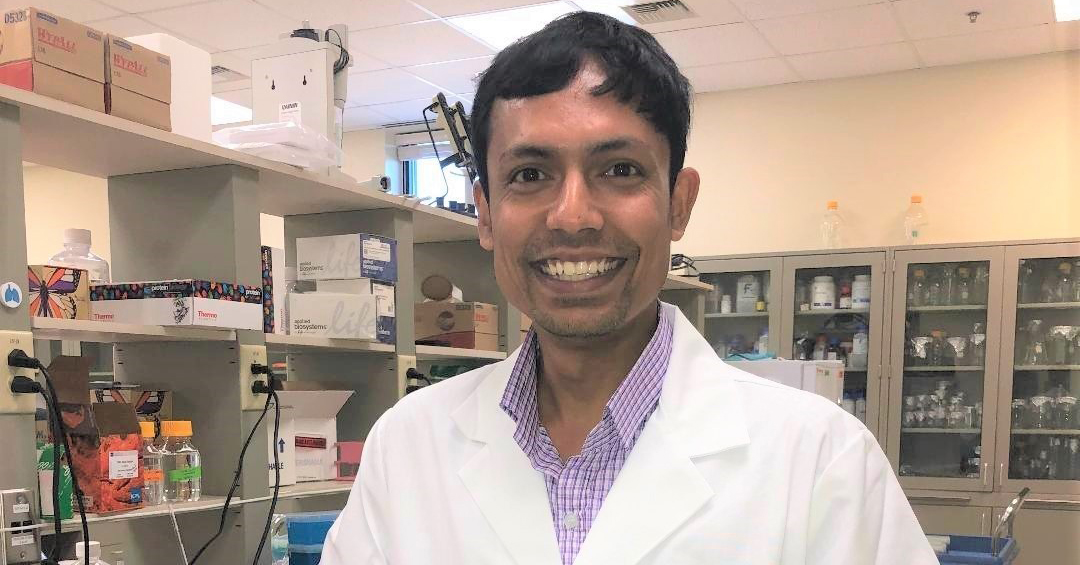Abilene Scientist Receives Grant to Research Novel Brain Tumor Treatment
Saha to Investigate Use of Viruses to Attack, Weaken Deadly Glioblastoma Cells

An estimated 700,000 people in the U.S. are living with a brain tumor and nearly 80,000 new cases are diagnosed each year. Glioblastoma (GBM), an aggressive cancer most often found in the brain, is responsible for more than 75% of these tumors. Currently there are no effective treatments for GBM, which is almost always fatal, and most patients die 12-18 months after initial diagnosis.
In an effort to improve the prognosis for GBM patients, the U.S. Department of Defense recently awarded a $550,491 grant to Dipongkor Saha, D.V.M., Ph.D., a cancer immunologist and assistant professor of immunotherapeutics and biotechnology at the Texas Tech University Health Sciences Center (TTUHSC) Jerry H. Hodge School of Pharmacy in Abilene.
“Our goal is to develop a novel and safe treatment strategy that should provide treatment relief to a significant number of individuals suffering from this devastating disease,” Saha said.
Saha’s current research is primarily focused on inciting anti-tumor immunity, which is when the body recognizes and begins an immune response to certain antigens expressed by cancer, known as tumor associated antigens (TAAs). He is investigating the use of oncolytic virus therapy, which uses certain viruses to attack and compromise cancer cells while leaving the adjacent healthy cells to function normally. The process can kill cancer cells or weaken them so that other treatments like radiation and chemotherapy may be more effective.
In the studies proposed by his new grant, Saha said he not only will investigate how to effectively induce immunity against tumor cells, but also seek ways to divert the body’s immune system specifically toward TAAs.
“Importantly, TAAs are exclusively present in cancer cells, but absent or present at an insignificant level in healthy cells,” Saha explained. “Therefore, the TAA-targeted treatments will only kill cancer cells while sparing healthy cells, thus conferring safety to treated individuals.”
Saha’s grant funding began Sept. 1 and is scheduled to run through August 2023.
Related Stories
Celebrating Veterans: TTUHSC’s General Martin Clay’s Legacy of Service and Leadership
From his initial enlistment in the Army National Guard 36 years ago to his leadership in military and civilian health care management roles, Major General Martin Clay’s career has been shaped by adaptability, mission focus and service to others.
Texas Tech University Health Sciences Center School of Nursing Named Best Accelerated Bachelor of Science in Nursing Program in Texas
The TTUHSC School of Nursing Accelerated Bachelor of Science in Nursing (BSN) program has been ranked the No. 1 accelerated nursing program in Texas by RegisteredNursing.org.
TTUHSC Names New Regional Dean for the School of Nursing
Louise Rice, DNP, RN, has been named regional dean of the TTUHSC School of Nursing on the Amarillo campus.
Recent Stories
The John Wayne Cancer Foundation Surgical Oncology Fellowship Program at Texas Tech University Health Sciences Center Announced
TTUHSC is collaborating with the John Wayne Cancer Foundation and has established the Big Cure Endowment, which supports the university’s efforts to reduce cancer incidence and increase survivability of people in rural and underserved areas.
TTUHSC Receives $1 Million Gift from Amarillo National Bank to Expand and Enhance Pediatric Care in the Panhandle
TTUHSC School of Medicine leaders accepted a $1 million philanthropic gift from Amarillo National Bank on Tuesday (Feb. 10), marking a transformational investment in pediatric care for the Texas Panhandle.
Texas Tech University Health Sciences Center Permian Basin Announces Pediatric Residency Program Gift
TTUHSC Permian Basin, along with the Permian Strategic Partnership and the Scharbauer Foundation, Feb. 5 announced a gift that will fund a new pediatric residency.
